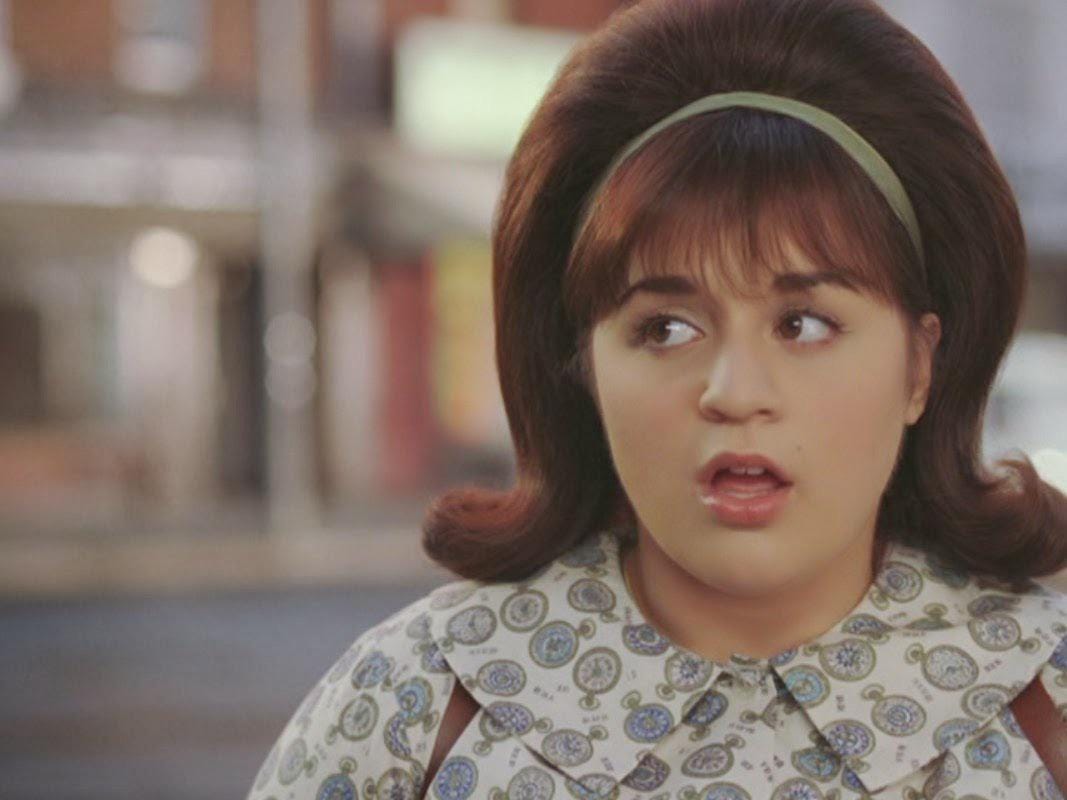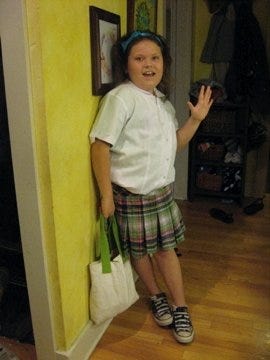Hairspray (2007) was one of the first movies I saw in theaters. First grade had just wrapped and, on a hot summer day, my dad decided that I had graduated from kiddie films to real cinema. From my aisle seat, I was transfixed. Zac Efron fresh out of Kenny Ortega dance boot camp, John Travolta in (convincing) drag, well-directed, high energy show tunes numbers––the movie had it all. But, of course, I was most struck by Tracy: a fat, pretty teenager who danced like a superstar and carried herself with unmistakable charisma. In the early aughts, this was unthinkable.
For those who haven’t experienced the magic, Hairspray is a musical reimagining of the 1988 John Waters film. It follows plus-sized high school student, Tracy Turnblad’s (Nikki Blonsky) infiltration of the popular Baltimore dance program, The Corny Collin’s Show. Set in 1962, against a Civil Rights Movement backdrop, Tracy finds herself squarely at the crossroads between old, bigoted traditions and a brighter, more progressive future.
“Welcome to the rhythm of a brand new day
Take your old-fashioned fears and just throw them away”
She croons to her mother, Edna (John Travolta) in the song “Welcome to the 60’s”.
As a little girl, I was enamored. I wore headbands and hoped my hair would miraculously defy gravity like hers. I admired the way she got in trouble, spoke too loudly, and stood by her principles. I downloaded the soundtrack on my iPod Shuffle. I had my mom tease fake bangs into my hair for Halloween. Tracy was an icon.
It was strange, people liked Tracy. They liked her despite her fatness. In fact, they liked her because of her fatness. Her obvious stardom is subdued only by the old guard––still hung up on the same three moves and their beauty pageant wins from decades prior. But the rebels, the outcasts, the people we identify with as audience members, they all love Tracy. She’s a sign of the hopefulness that I imagine came with the early 60s. Maybe a different world is possible, the film posits.
For the first time in my life, fat acceptance was a mark of progress.
My body became real to me in second grade. Compared to other girls, I was lucky––I didn’t know enough to be cruel to myself. Instead, I surveyed 22 pairs of knobby knees and pointy elbows as we convened for morning circle time. Tiny hands and jutting ribcages made me think I wish there were somebody else like me here. It occurred to me that I needed an ally, someone I could look across the circle and give a look like: can you believe all these skinny kids? And they would nod knowingly. It wasn’t self-hatred, it was a slow acceptance of a piece of my identity I didn’t realize I’d have to claim: fatness.
I like to think that Hairspray informed my early understanding of fatness as a political identity. It transcended numbers on a scale. It followed me to swim practice and through the hallways of my crunchy, granola elementary school. It was more than something I could fix.
Lindy West, a fat writer and comedian, jokes with Ira Glass in an episode of This American Life that she “came out” as fat as a young adult. “The way that we are taught to think about fatness,” West explains, “ is that fat is not a permanent state. You're just a thin person who's failing consistently for your whole life…then at some point, I just was like, you know, it's fairly likely that I'm going to be fat forever. So why am I putting off figuring out how to live with that? I should, rather than spending all my time counting almonds, why not try to figure out how to be happy now?”
Tracy Turnblad is not a thin person trapped in a fat person’s body. She is a vibrant, happy, defiant, fat person. She takes centerstage on the Corny Collins Show, she gets the guy. Possibly most essentially, Tracy’s fatness informs her solidarity.
Sent to detention for ornery behavior, Tracy befriends the Black students who are relegated to the margins of their reluctantly integrated school. She dances with them––discovering that their moves are creative and more challenging than anything attempted on television. The film culminates with Tracy and her friends escaping from the police and taking over a dance competition––the ultimate winner, a young Black girl named Little Inez (Tayla Parx) who had previously been barred from dancing with the white kids.
Equally glamorous is Motormouth Maybelle (Queen Latifah)––a radio DJ who unifies Black students in favor of integration. Latifah is expertly cast––one of the first plus-sized women (which, again, is used as a relative, political term) to grace the screen as a lead in a rom-com. Despite racism, despite fatphobia, Queen Latifah’s charm shines so bright it can’t be quelled.
I’ll never claim that the message in Hairspray is a beacon of progressivism. It’s ok to be different! The film claims simply. Perhaps it could go further, say more. Perhaps it’s safely located in the past. But something about the combination of legends, childhood heartthrobs, and a fat teenager plucked from obscurity and given It Girl status felt life-changing in some small way. A world where I can exist freely is somewhere, we just have to fight for it.
I’ve been thinking about Hairspray extra lately because of Gigi Hadid’s hapless Vogue tribute video. The slender model is accompanied by other slender pop culture figures to “recreate” the iconic musical, sans any reference to Tracy’s fatness. If that wasn’t bad enough, Hadid claims that she feels a connection to the show because she played Amber Von Tussle. That’s right, the racist antagonist who bullies Tracy and fights for The Corny Collins Show to remain segregated.
This erasure felt alarming, but maybe this is always how this play ends. Against Victoria’s Secret Angels and a fierce diet culture, representation felt revolutionary. Soon after wrapping, though, Nikki Blonsky was embroiled in a scandal that included a racist tirade over some seats at an airport. Then she starred in the one-season comedy Huge that followed a teenager sent to fat camp. In wider culture, the world swung back around and we’ve arrived back at heroin chic. The body positivity influencers have lost the weight. Hairspray is an ad campaign helmed by a woman whose mother basically founded the idea of an almond mom.
Maybe it was wrong to believe a movie could be the key to solidarity among oppressed classes. But I’m letting Hairspray exist in my mind the way it did when it hit theaters when I was a kid. I listened to “You Can’t Stop The Beat” every day on the way to school. It was cheesy sure, but I was always moved. I imagined myself like Tracy, emerging from a tube in the center of the stage, my hair slicked back. My skin-tight dress was fabulous, even though it was the kind strictly made for skinny girls. I watch as Little Inez is crowned Miss Teenage Hairspray. We are on the precipice of something new, something better.







I remember that girl ❤️ What a cutie!
Illuminating as always!!